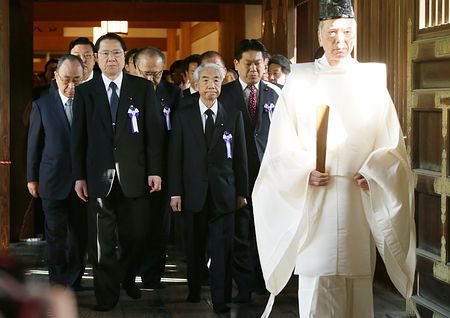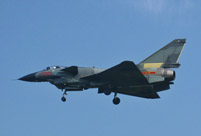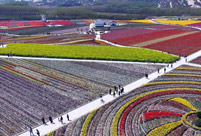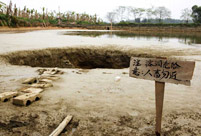


TOKYO, April 22 -- A group of around 90 Japanese lawmakers, including a senior member of Prime Minister Shinzo Abe's Cabinet, on Friday visited the controversial war-linked Yasukuni Shrine which stands as a symbol of Japan's militarism and honors its war dead including criminals convicted by an international tribunal.
The group of lawmakers visiting the shrine, comprising Internal Affairs and Communications Minister Takaichi Sanae, as well as Shuichi Takatori, senior vice minister of the Cabinet Office, and Yoshitaka Ito, senior vice agriculture minister, follows Abe making a ritual offering of a "masakaki" tree to the notorious shrine in Tokyo a day earlier.
Labor and Welfare Minister Yasuhisa Shiozaki, House of Representatives Speaker Tadamori Oshima and House of Councillors President Masaaki Yamazaki made similar offerings on the same day.
Seiichi Eto, Abe's special advisor, and Liberal Democratic Party and lower house member, Keiji Furuya, meanwhile, visited the contentious war-linked shrine in person, while Abe's offering was made by proxy.
Such gestures, by way of proxy of otherwise made at the war shrine, draw the ire of Japan's neighboring countries, particularly China and South Korea, who both suffered immeasurably at the hands of Japan's brutal militarism before and during WWII and were both quick to denounce the visits and the offerings on Thursday.
The controversial war shrine honors the souls of some 2.5 million war dead, including more than 1,000 war criminals convicted by a post WWII court, including 14 Class-A war criminals as adjudicated by the war crimes tribunal.
For the victim countries of Japan's wartime atrocities, the shrine is a living reminder of the horrors inflicted by the Japanese army during its time occupying countries, particularly in East Asia, and a symbol of ultra-rightwing defiance and a stronghold of contemporary historical revisionism, militarism and an imperialistic mentality.
Abe himself has not visited the shrine since he paid an ill-advised tribute there in person in December 2013, the fallout of which saw Japan's ties with its closest neighbors effectively disintegrate and the Japanese leader strongly reprimanded by the United States for inflaming regional tensions.
 The evolution of J-10 fighter
The evolution of J-10 fighter Top 10 Asian beauties in 2016
Top 10 Asian beauties in 2016 What's happening in Xisha Islands?
What's happening in Xisha Islands? When female soldiers meet flowers
When female soldiers meet flowers North Sea Fleet conducts drill in West Pacific Ocean
North Sea Fleet conducts drill in West Pacific Ocean Old photos record the change of Sichuan over a century
Old photos record the change of Sichuan over a century Breathtaking aerial photos of tulip blossoms in C China
Breathtaking aerial photos of tulip blossoms in C China Horrific: Pit swallows 25 tons of fish overnight
Horrific: Pit swallows 25 tons of fish overnight Vietnamese Su-30 fighters fly over Nanwei Island in South China Sea
Vietnamese Su-30 fighters fly over Nanwei Island in South China Sea Top 20 hottest women in the world in 2014
Top 20 hottest women in the world in 2014 Top 10 hardest languages to learn
Top 10 hardest languages to learn 10 Chinese female stars with most beautiful faces
10 Chinese female stars with most beautiful faces China’s Top 10 Unique Bridges, Highways and Roads
China’s Top 10 Unique Bridges, Highways and Roads When can a fan call it quits
When can a fan call it quits Expats aim for the silver screen
Expats aim for the silver screen Press freedom index hides absurd logic
Press freedom index hides absurd logic Toxic campus scandal tests govt ability to build public trust
Toxic campus scandal tests govt ability to build public trustDay|Week